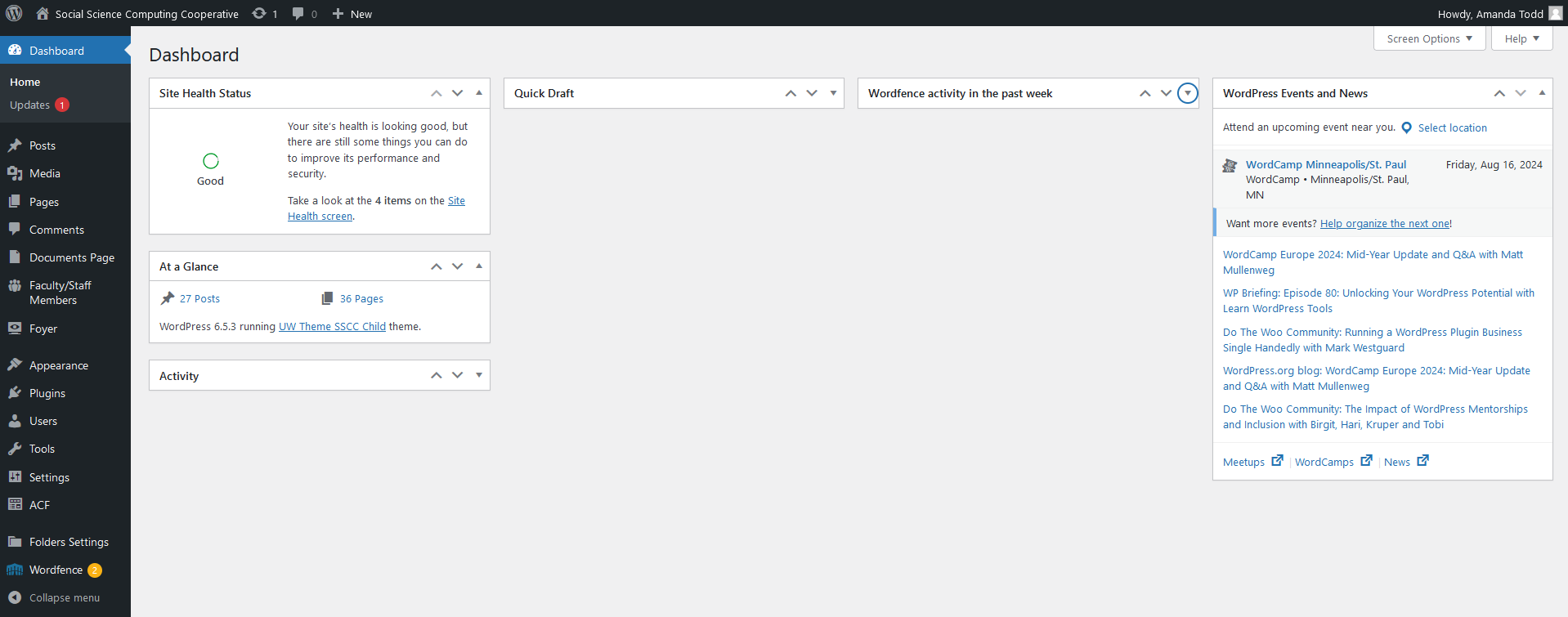Topics Map > User Services > Web
Getting Started with WordPress
Site creation and management is done entirely via a web interface so no special software is needed to create a site, and it can be edited from any computer with an internet connection. For more information on the features of WordPress, please see http://codex.wordpress.org/WordPress_Features.
Getting a WordPress site
SSCC Members can request a WordPress site by contacting the SSCC Help Desk. Your site URL will be http://ssc.wisc.edu/~username (you can also customize this location).
WordPress uses a separate account from your regular SSCC account. Once your site has been set up, you will receive an email with login information. You will be prompted to reset your password on first login.
The files for your site will be stored in the PUBLIC_web directory on your web server.
Setting up your WordPress site
You can access the WP site administration Dashboard at http://ssc.wisc.edu/~username/wp-admin. The Dashboard is where you create tables and manage your site. For more information on the administration options for your site, please see http://codex.wordpress.org/Administration_Panels.
By default your site title is set to your full name, with "My SSCC Homepage" as the tagline. This can be changed by going to Settings -> General.
Updating WordPress
It is your responsibility to keep your WordPress site up to date. Outdated versions of the WordPress software may have security problems that put your site content and the SSCC web server at risk. When a new version of WordPress is available, a link will appear at the top of your Dashboard as in the image above. You can also check for updates by clicking Dashboard -> Updates on the navigation panel to the left.
A word of caution about updating: If you use plugins or custom themes, check that they will work with the new release before updating or you may lose their functionality. You can check compatibility by searching for your individual plugins at http://wordpress.org/extend/plugins/.
Choosing a Theme
The look and feel of your WordPress site is determined by the Theme you choose. As this will effect how your site content is displayed, it is generally recommended to choose a theme first before you add content. Your SSCC site will have a UW-Madison theme set as default. If you do not want your site to be UW-branded, you are welcome to change your theme to any of the included default WordPress themes or to install your own theme from the thousands of options in WordPress's theme library. You can change and install themes by going to Appearance -> Themes.
For more information on choosing and working with Themes, please see http://codex.wordpress.org/Using_Themes.
Adding your Content
Your SSCC WP site will have a Home page created by default; to create additional pages go to Pages -> Add New.
Content (including text, media, pictures, PDFs, Word Documents, etc.) can be added to your Pages via the "What You See Is What You Get" editor or via HTML coding. For information on adding different types of content and media, please see https://wordpress.com/support/video-tutorials/add-content-and-media/
Using Plugins
WordPress plugins can be installed to extend the functionality of your site to meet your needs. Plugins can include spam filters, photo galleries, weather reports, Twitter/RSS feeds, site counters, calendars, etc. For more information on using plugins and to access the official WordPress plugin repository, please see http://codex.wordpress.org/Plugins.
WordPress.org has excellent documentation on WP and all of its functions, from basic to advanced, which can be found here: http://codex.wordpress.org/

